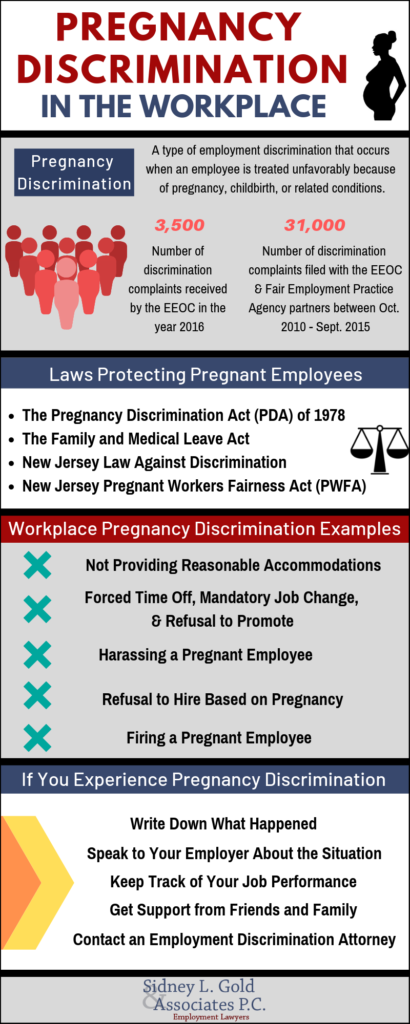Pregnancy Discrimination in the Workplace – Infographic
January 23, 2019While pregnancy is generally a time of joy, many women continue to face discrimination and unfair treatment in the workplace due to their pregnancy.
In fact, in 2016, the Equal Employment Opportunity Commission (EEOC) received more than 3,500 pregnancy discrimination complaints. Between October 2010 and September 2015, approximately 31,000 charges of pregnancy discrimination were filed with the EEOC and state-level fair employment practice agencies.
What is Pregnancy Discrimination?
Pregnancy discrimination in the workplace occurs when a female employee is treated unfavorably due to her pregnancy. Examples of pregnancy discrimination include failing to provide workers with reasonable accommodations (such as an exception to the dress code or “no sitting” policy), forcing an employee to take time off or change jobs, and terminating an employee due to her pregnancy. Not considering a pregnant employee for a job promotion and denying an employee a job are also acts of pregnancy discrimination. Pregnant workers may be harassed by superiors for their pregnancy, creating a hostile work environment.
Laws Protecting Pregnant Employees
Pregnancy discrimination is prohibited under federal and New Jersey laws. The two federal laws that protect pregnant employees are the Pregnancy Discrimination Act (PDA) of 1978 and the Family and Medical Leave Act. The PDA protects women from being fired or discriminated against due to pregnancy- and childbirth-related medical conditions. Under the Family and Medical Leave Act, employers are required to provide unpaid, job-protected leave for certain family and medical reasons, including pregnancy and caring for a new child.
New Jersey laws provide pregnant workers with additional rights. The New Jersey Law Against Discrimination (NJLAD) prohibits employers from discriminating against women based on pregnancy, childbirth, and related medical conditions. The Pregnant Workers Fairness Act (PWFA), an amendment to the NJLAD, strengthens protection for pregnant workers. Under the PWFA, employers cannot treat a female employee they know is pregnant or affected by pregnancy any less favorably than other employees. The PWFA also requires that employers provide pregnant workers with reasonable accommodations based on the advice of their doctors. Reasonable accommodations may include restroom breaks, periodic rest, and a modified work schedule.
New Jersey is also one of a handful of states with its own family and medical leave law. The state law allows employees to take up to 12 weeks of leave in any 24-month period to care for a family. The federal Family Medical Leave Act (FMLA) gives eligible employees up to 12 weeks of unpaid leave in a one-year period.
To help you better understand workplace pregnancy discrimination and your rights during pregnancy, our Cherry Hill employment lawyers have created this infographic.
If you believe your New Jersey employer has discriminated against you because of your pregnancy or pregnancy-related condition, our lawyers are well versed in pregnancy discrimination and employment law and will fight for your rights. Call us today at 215-569-1999 for a free case assessment or contact us online.






























